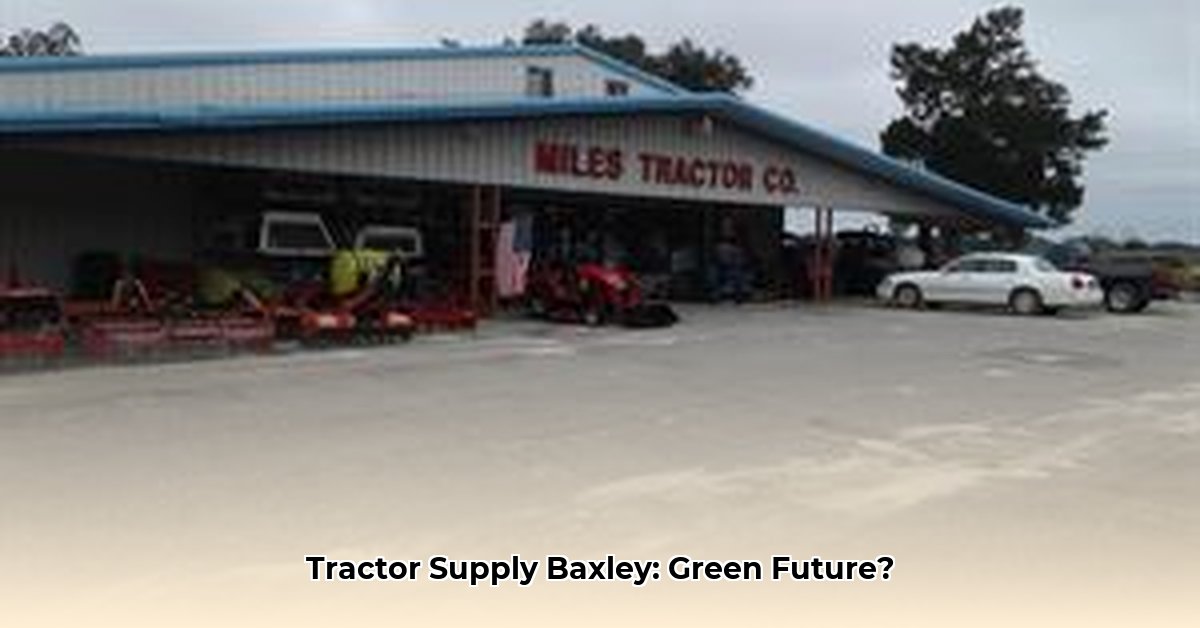
Tractor Supply Co. (TSC) in Baxley, Georgia, serves a crucial role in the local agricultural community. But does its presence translate to meaningful support for sustainable farming practices? This investigative report explores that question, revealing a complex picture where potential for positive impact clashes with significant data limitations. The story unfolds in a rural Georgia town where farming is deeply ingrained in the culture, yet the future of sustainable agriculture hangs in the balance. Keywords: Tractor Supply, sustainable agriculture, Baxley Georgia, rural farming, environmental stewardship, eco-friendly farming, organic farming, sustainable practices, precision agriculture, water conservation, soil health.
The Baxley Farming Landscape: A Rich History, An Uncertain Future
Baxley, nestled within Appling County, boasts a long history of agriculture. Generations of farmers have tilled its land, contributing to the region’s economic vitality and cultural identity. However, the modern farming landscape faces increasing pressure. Profitability is challenged by fluctuating market prices and rising input costs, while environmental concerns—soil degradation, water scarcity, and the impact of pesticides—put further stress on the system. How can farmers balance the need for economic viability with environmental responsibility? This is where the role of TSC becomes a critical component of the investigation.
Tractor Supply Baxley: A Gateway to Resources?
Tractor Supply’s presence in Baxley provides convenient access to a wide range of agricultural supplies. The store’s location and the sheer volume of farmers it serves strongly suggest a significant potential influence on local agricultural practices. Do farmers rely on TSC for their primary supplies? What's their buying behavior? These crucial questions remain largely unanswered due to a critical lack of public data.
The Data Deficit: A Major Obstacle
A significant challenge in assessing TSC’s impact is the scarcity of readily available data. While anecdotal evidence points towards TSC as a primary supplier for many local farmers, we lack quantifiable information on key aspects:
- Sales data on sustainable products: How many organic seeds, water-efficient irrigation systems, or environmentally friendly pest control solutions are sold? Without this data, we can only speculate about the store's contribution to sustainable agriculture.
- Internal sustainability initiatives: Does TSC Baxley have any internal programs or commitments to promoting sustainable farming practices? This critical information is currently unavailable.
- Farmer surveys: Gathering direct feedback from farmers on their experience with TSC and the availability of sustainable supplies is crucial. This research is conspicuously absent.
This lack of transparency hinders a complete evaluation. It's akin to attempting to understand a river's flow without knowing its volume or velocity. The potential for TSC's positive impact exists, but the actual flow remains unseen.
Unpacking the Potential: Where TSC Could Make a Difference
Despite the data gaps, we can identify areas where TSC could significantly contribute to sustainable farming in Baxley. The store's prominence provides a unique opportunity to influence farming practices.
- Directly increasing access to sustainable inputs: Stocking a wider variety of organic seeds, biopesticides, and water-efficient irrigation technologies would directly empower farmers to make more environmentally conscious choices.
- Promoting education and outreach: Collaborating with local agricultural extension agencies or environmental organizations to offer workshops and educational materials would equip farmers with the knowledge needed to adopt sustainable practices effectively.
- Supporting local initiatives: Partnering with local farmers’ markets or community-based organizations focused on sustainable food systems can create a holistic approach to supporting a thriving agricultural sector.
Dr. Emily Carter, Professor of Environmental Science at the University of Georgia, highlights this point: "Retailers like Tractor Supply have a significant role to play in shaping agricultural practices. By strategically prioritizing sustainable products and providing educational resources, they can empower farmers to adopt eco-friendly methods."
A Path Forward: Recommendations for Action
Overcoming the current data limitations requires a multi-pronged approach:
Transparency from Tractor Supply: TSC should publicly release data on the sales of sustainable agricultural products. This transparency is crucial for assessing the actual environmental impact of their operations.
Independent Research: A comprehensive study involving surveys, interviews, and sales data analysis is needed, focusing on the impact of TSC on farmer choices and on the adoption of sustainable practices.
Community Collaboration: Building partnerships between TSC, local farmers, agricultural extension agencies, and environmental organizations is needed to create a sustained effort in promoting sustainable agriculture. This involves sharing data and information and working together to develop local solutions.
Policy Support: Governments at the county and state level can establish incentives to encourage the adoption of sustainable practices and reward businesses that actively promote them.
These actions are not merely suggestions—they are crucial steps toward fostering a more sustainable agricultural future in Baxley. The current lack of data underscores the need for pro-active engagement, ensuring a clear understanding of TSC's impact.
Conclusion: A Partnership for Sustainability
Tractor Supply Baxley has the potential to play a significant role in supporting sustainable agriculture. However, the current lack of accessible data is a critical impediment to understanding its actual impact. By prioritizing transparency, conducting rigorous independent research, and fostering community collaboration, we can move toward a future where the needs of the environment and the needs of local farmers are harmoniously balanced. This is not merely about the tools available; it’s about a partnership for progress, one that builds a sustainable agricultural future for the entire community.